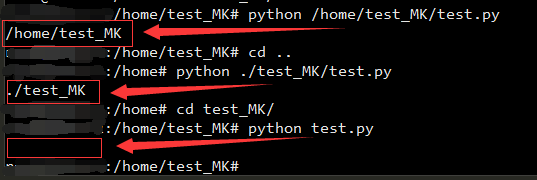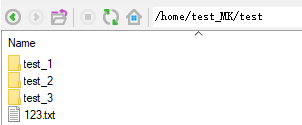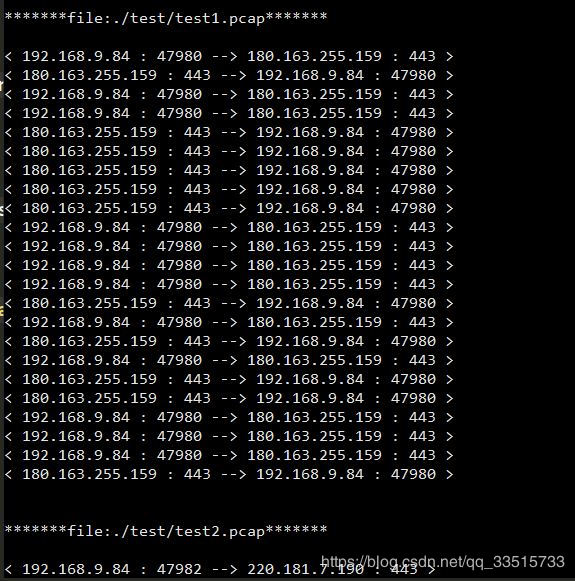这篇文章主要为大家展示了“python如何遍历文件目录以及批量处理同类文件”,内容简而易懂,条理清晰,希望能够帮助大家解决疑惑,下面让小编带领大家一起研究并学习一下“python如何遍历文件目录以及批量处理同类文件”这篇文章吧。
具体内容如下
目录操作
1、获取当前目录
import os curr_path=os.path.dirname(__file__) #返回当前文件所在的目录,即当前运行的脚本所在父目录 print curr_path
运行示例

(1)使用os.path.dirname(__file__)时,是针对运行时对所给程序脚本的路径来获取父目录的,即截取你输入的脚本路径的所在目录名称,如上图示例,输入绝对路径时返回绝对路径,输入相对路径时返回相对路径,如果只输入了脚本名称,则返回空。
(注:当从命令行中进入python环境时时,参数__file__不能使用)
(2)当直接使用os.path.dirname(“/home/test_MK/test.py”)时,直接返回“/home/test_MK”
2、获取目录文件列表
file_list=os.listdir("/home/test_MK/test"))
print file_list运行示例


3、获取该目录下文件夹或者文件列表
path="/home/test_MK/test" objects=os.listdir(path) dir_list=[] #存放目录列表 file_list=[] #存放文件列表 for obj in objects: if os.path.isdir(os.path.join(path, obj)):#判断是否是目录os.path.join()用来将路径拼接 dir_list.append(os.path.join(path, obj))#保存时保存完整路径才能对其进行后续操作 print "dir:",obj else: file_list.append(os.path.join(path, obj)) print "file:",obj print "目录列表:",dir_list print "文件列表:",file_list #如果项判断是否是文件时用os.isfile()
(注:使用os.isdir()与os.isfile()时,参数必须是一个相对路径或者绝对路径,不能光是一个文件名或者目录名称,这也是上面示例代码中使用os.path.join()的原因,否则函数将判断不出正确结果)
运行示例

批量处理目录下同类文件
以处理pcap文件为例
1、获取某一文件夹下所有pcap包路径,过滤掉其它文件
def getPathFile(path):
'''
name:getPathFile
function:获取所给文件夹下所有pcap文件路径
path:所给文件夹路径
'''
Path = []
try:
pathDir = os.listdir(path)
for allDir in pathDir:
child = os.path.join('%s/%s' % (path, allDir))
#跳过文件夹以及非流量包文件,将后缀名改为自己需要的文件类型即可实现自己的过滤
if os.path.isfile(child) and (".pcap" in str(allDir) or (".cap" in str(allDir))):
Path.append(child)
except:
pass
return Path2、处理函数,打印一个pcap文件中所有数据包的五元组信息{src_ip,src_port,dst_ip,dst_port}
def print_pack_f(file_path): ''' name:print_pack_f function:打印一个pcap文件中所有数据包的五元组信息 file_path:所给pcap文件路径 ''' file_p= open(file_path) pcap = dpkt.pcap.Reader(file_p) if not pcap: return print "\n\n*******file:%s*******\n"% file_path for (ts,buf) in pcap: try: eth = dpkt.ethernet.Ethernet(buf) #解包,物理层 if not isinstance(eth.data, dpkt.ip.IP): #解包,网络层 continue ip = eth.data src_ip="%d.%d.%d.%d"%tuple(map(ord,list(ip.src))) dst_ip="%d.%d.%d.%d"%tuple(map(ord,list(ip.dst))) if (not isinstance(ip.data, dpkt.tcp.TCP)) and (not isinstance(ip.data, dpkt.udp.UDP)): #解包,传输层 continue transf= ip.data print "<",src_ip,":",transf.sport,"-->",dst_ip,":",transf.dport,">" except Exception,err: print "[error] %s" % err
3、调用示例
def main(dir_path): all_file_path=getPathFile(dir_path) #获取目录下所有pcap文件路径 for file in all_file_path: #遍历处理 print_pack_f(file) #单个pcap文件处理,可将本函数替换成自定义的功能,便可实现批量处理 if __name__ == '__main__': opts,args = getopt.getopt(sys.argv[1:], "hi:") #从命令行获取参数 if not opts: #若没有带参数 print "\n\ *******************\n\ warn! please enter related parameters,enter -h for help!\n\n\ *******************\n" sys.exit() input_path='' for op, value in opts: if op == "-i": input_path = value elif op == "-h": usage() #帮助信息,只是简单的一个输出函数,输出内容自定义 sys.exit() main(input_path)
结果展示
测试目录如下

运行结果(python test.py -i ./test)

以上是“python如何遍历文件目录以及批量处理同类文件”这篇文章的所有内容,感谢各位的阅读!相信大家都有了一定的了解,希望分享的内容对大家有所帮助,如果还想学习更多知识,欢迎关注亿速云行业资讯频道!
免责声明:本站发布的内容(图片、视频和文字)以原创、转载和分享为主,文章观点不代表本网站立场,如果涉及侵权请联系站长邮箱:is@yisu.com进行举报,并提供相关证据,一经查实,将立刻删除涉嫌侵权内容。